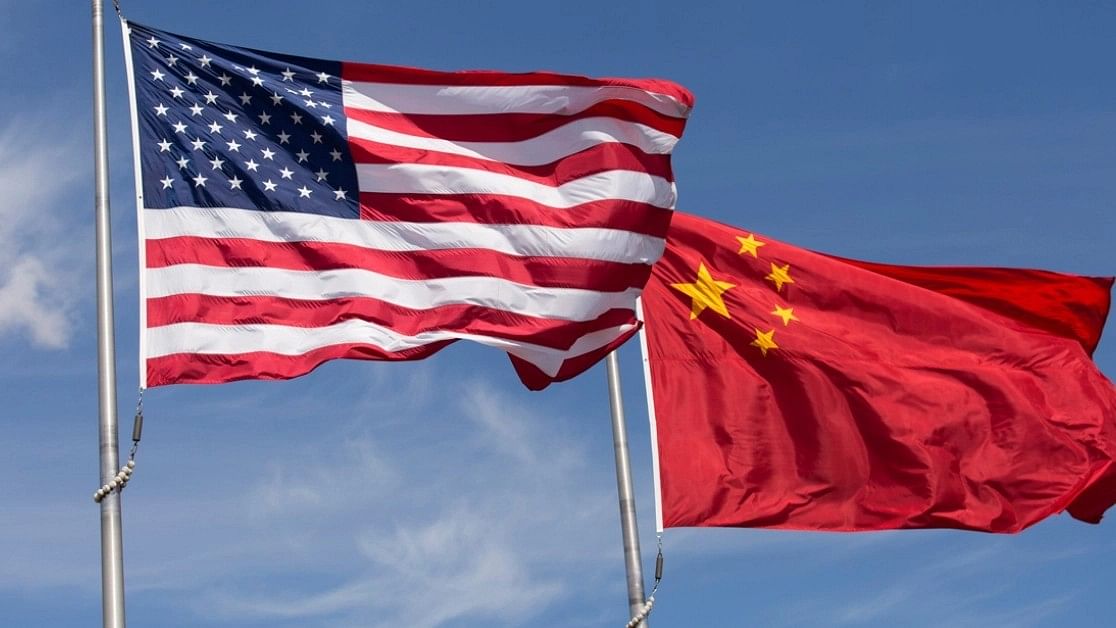
US, China flags.
Credit: iStock Photo
As Indians prepare to vote, Prime Minister Narendra Modi has introduced a surprising new element into the political discourse — China. He did not do it off the cuff. It was a well-considered, thoughtful, written response to questions submitted by Newsweek. That means the answers were either written or vetted by those in the higher echelons of the government dealing with Beijing. The inter-agency process in the government, which is generally weak in New Delhi — unlike in Washington, for instance — would have come into play.
Modi’s written response was followed up with a 90-minute face-to-face conversation at his official residence this week with the senior-most leadership team at the magazine. The Prime Minister’s reiteration of his written remarks in the follow-up meeting is a clear indication of his desire to move forward on relations with Beijing during Modi’s third term, which he is hopeful of winning on June 4.
China quickly grasped the import of Modi’s comments in the interview. Not even 24 hours had passed since Newsweek published the interview on April 10, when Chinese Foreign Ministry spokesperson Mao Ning responded. “We hope that India will work with China, approach the bilateral relations from a strategic height and long-term perspective, keep building trust and engaging in dialogue and cooperation, and seek to handle differences appropriately to put the relationship on a sound and stable track,” she said. It can be safely predicted that this is what can be expected if Modi returns to power.
There have been enough indications during the troubled years of Sino-Indian ties during Modi’s second term that the prime minister desires to put these troubles behind him. Unlike some close aides of his, who are never shy of demonstrating their Sinophobia, Modi’s public persona has often reflected his belief that beyond a point, competition with China only for its sake, can be wasteful. The fact is India lags way behind China in doing business with the world. In a section sub-headed ‘On competing with China’, in the Newsweek interview, the prime minister averred about
his government’s reforms that have global ramifications. “We believe that when a country with one-sixth of the world’s population adopts global standards...it will
have a big positive impact on the world.”
The elephant in the room whenever India and China engage each other is the United States. The feeling is growing in New Delhi that Washington cannot be trusted. The 105-minute telephone conversation between US President Joe Biden and his Chinese counterpart Xi Jinping, on April 9, an extensive six-day visit to China by US Treasury Secretary Janet Yellen, which coincided with the phone call and a string of similar Sino-US dealings should disabuse influential sections of the Indian political class of the notion that the US will stand by India in any confrontation with China. The White House and the US State Department will be liberal in lip service in support of India. Nothing more. Amidst domestic preoccupations, it was lost on most Indians that Biden and Xi met face-to-face in California in November. That meeting has enunciated principles for stability in Sino-US relations, should Biden be re-elected president in November. India is not a factor at all in Sino-US engagement. Modi certainly would have been alerted to this by his foreign policy aides.
If, on the other hand, Donald Trump is victorious in the US elections, it will be worse for India on the China front. In May 2020, then-President Trump offered to mediate in the many skirmishes along the Himalayan boundaries. Many Indians were overjoyed at that offer. It was mostly lost on the public consciousness of Indians that a mediator cannot be a supporter of either side in a conflict. By offering to mediate, Trump made it clear that he was neutral on the problems between New Delhi and Beijing, despite protestations in vain to the contrary by his largely ineffective Secretary of State Mike Pompeo. Trump, if elected as the 47th US President will be high on bluff and bluster against Xi, no doubt. But he will not lift even a little finger to support India in any conflict with China beyond mouthing thundering statements.
Without doubt, Modi is conscious of this bipartisan state of play in Washington. That is why he underplayed the importance of the US-inspired Quad group and equated it with the BRICS plurilateral group and the Shanghai Cooperation Organisation. “We are present in different combinations in different groups,” he dismissed a question about Quad and China in his Newsweek interview.
(The writer has extensively covered West Asia and reported from Washington as a foreign correspondent for 15 years)